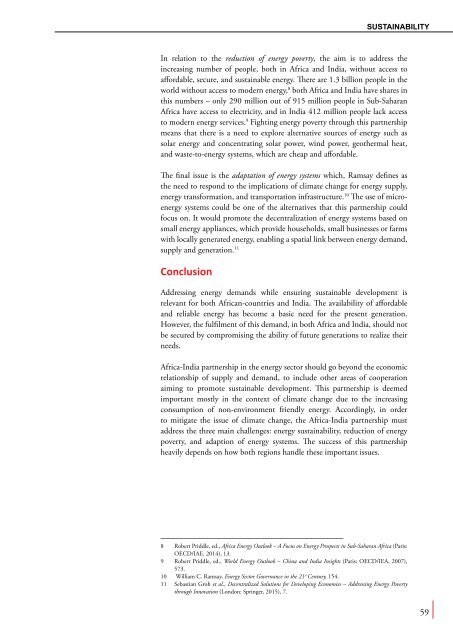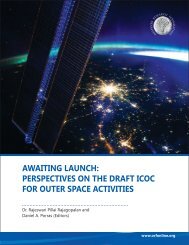Common Futures
II3UUw
II3UUw
Create successful ePaper yourself
Turn your PDF publications into a flip-book with our unique Google optimized e-Paper software.
Sustainability<br />
In relation to the reduction of energy poverty, the aim is to address the<br />
increasing number of people, both in Africa and India, without access to<br />
affordable, secure, and sustainable energy. There are 1.3 billion people in the<br />
world without access to modern energy, 8 both Africa and India have shares in<br />
this numbers – only 290 million out of 915 million people in Sub-Saharan<br />
Africa have access to electricity, and in India 412 million people lack access<br />
to modern energy services. 9 Fighting energy poverty through this partnership<br />
means that there is a need to explore alternative sources of energy such as<br />
solar energy and concentrating solar power, wind power, geothermal heat,<br />
and waste-to-energy systems, which are cheap and affordable.<br />
The final issue is the adaptation of energy systems which, Ramsay defines as<br />
the need to respond to the implications of climate change for energy supply,<br />
energy transformation, and transportation infrastructure. 10 The use of microenergy<br />
systems could be one of the alternatives that this partnership could<br />
focus on. It would promote the decentralization of energy systems based on<br />
small energy appliances, which provide households, small businesses or farms<br />
with locally generated energy, enabling a spatial link between energy demand,<br />
supply and generation. 11<br />
Conclusion<br />
Addressing energy demands while ensuring sustainable development is<br />
relevant for both African-countries and India. The availability of affordable<br />
and reliable energy has become a basic need for the present generation.<br />
However, the fulfilment of this demand, in both Africa and India, should not<br />
be secured by compromising the ability of future generations to realize their<br />
needs.<br />
Africa-India partnership in the energy sector should go beyond the economic<br />
relationship of supply and demand, to include other areas of cooperation<br />
aiming to promote sustainable development. This partnership is deemed<br />
important mostly in the context of climate change due to the increasing<br />
consumption of non-environment friendly energy. Accordingly, in order<br />
to mitigate the issue of climate change, the Africa-India partnership must<br />
address the three main challenges: energy sustainability, reduction of energy<br />
poverty, and adaption of energy systems. The success of this partnership<br />
heavily depends on how both regions handle these important issues.<br />
8 Robert Priddle, ed., Africa Energy Outlook – A Focus on Energy Prospects in Sub-Saharan Africa (Paris:<br />
OECD/IAE, 2014), 13.<br />
9 Robert Priddle, ed., World Energy Outlook – China and India Insights (Paris: OECD/IEA, 2007),<br />
573.<br />
10 William C. Ramsay, Energy Sector Governance in the 21 st Century, 154.<br />
11 Sebastian Groh et al., Decentralized Solutions for Developing Economies – Addressing Energy Poverty<br />
through Innovation (London: Springer, 2015), 7.<br />
59








